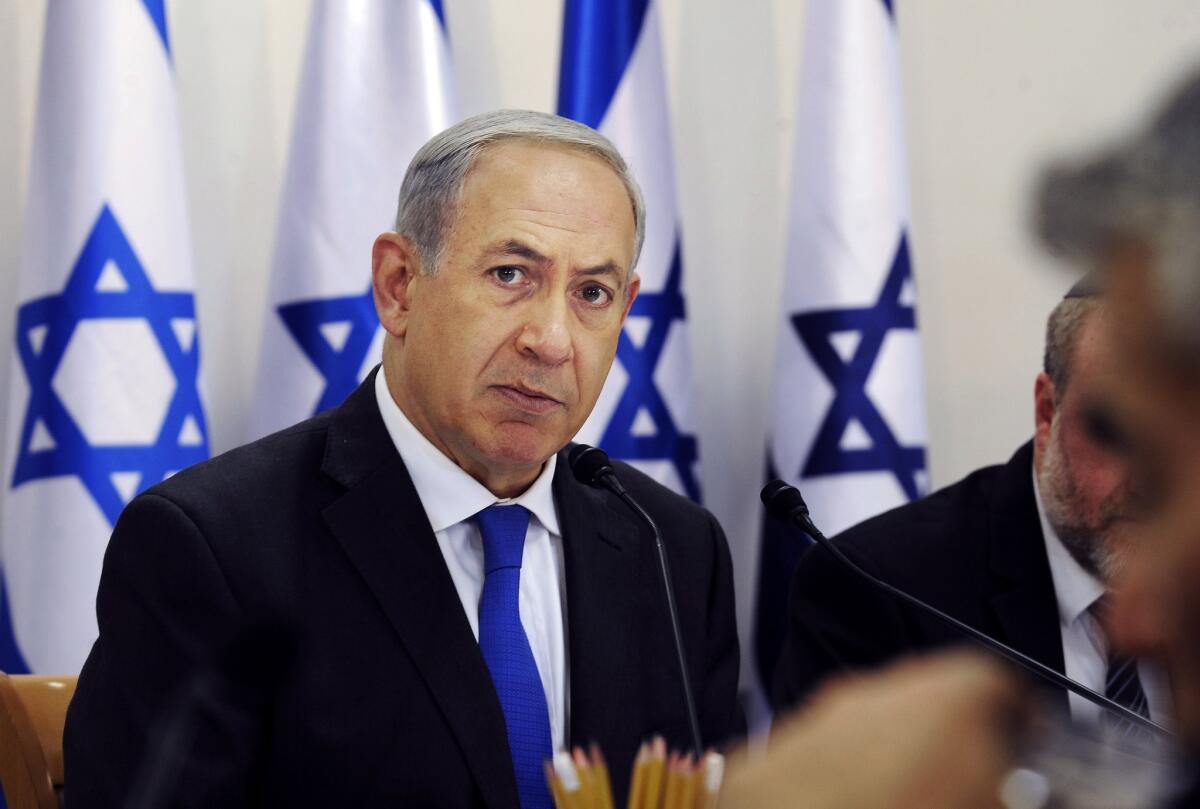Netanyahu’s bid for Israeli government majority slips away despite party’s top finish

- Share via
JERUSALEM — Israeli Prime Minister Benjamin Netanyahu’s political and legal peril increased Wednesday, as a completed parliamentary election vote tally affirmed his party as the country’s largest, but left his right-wing bloc without the majority it would need to govern.
Less than two weeks before he goes on trial on corruption charges, the 70-year-old prime minister saw fluctuations in the vote count from Monday’s election shrink the strength of his religious-nationalist coalition to three seats fewer than the 61 required for a governing majority.
As opponents sought to deny him a mandate to form a government, an angry Netanyahu accused his chief rival Benny Gantz, a former army chief of staff, of trying to “steal the election.”
With 100% of the regular ballots counted, Netanyahu’s Likud party had 36 seats, compared to 33 for Gantz’ Blue and White party, according to Wednesday’s tally. That was viewed as a devastating setback for the 60-year-old retired general, who had campaigned hard on a platform of Netanyahu’s unfitness to serve.
But the first-place finish for Netanyahu’s party proved no guarantee of success. In the tally released Wednesday, the seat count for the prime minister’s coalition — which initial exit polls had put as high as 60, the cusp of an overall victory — slipped back to 58, three short of a majority in the 120-seat Knesset, or parliament.
That count will not be officially ratified until next week. But it leaves Netanyahu dangerously exposed heading into his March 17 trial on charges of accepting bribes, fraud and breach of trust. He had hoped to shore up his position with a solid election win, then use the powers of his office to short-circuit his prosecution.
Even before the final tally, supporters of the prime minister — who staged a splashy celebratory rally Tuesday on the basis of early projections — sounded a drumbeat of complaints that he was being treated unfairly.
Netanyahu reacted harshly when Gantz on Wednesday proposed legislation that would prevent an indicted prime minister from continuing to serve. Addressing coalition members, the prime minister said Gantz’s move “undermines the foundations of Israeli democracy and subverts the will of the voter.”
“We’ll stand strong against it,” he vowed.
Netanyahu denies any wrongdoing in the corruption cases. Gantz has cited the criminal charges in refusing to form a “national unity” government of the two biggest parties while the prime minister heads Likud.
The initial mandate to try to form a government usually, but not always, goes to the head of the largest party. If neither Netanyahu nor Gantz can assemble a ruling majority, a deadlock would send Israelis back to the ballot box yet again — a prospect dreaded by nearly all.
As it was, Monday’s vote was an unprecedented third national election in less than a year, and a fourth in so short a time frame would be expensive and debilitating.
Political analyst Yaron Dekel, of Israel’s national broadcaster, said that instead of giving a mandate to either Netanyahu or Gantz, President Reuven Rivlin could choose instead to throw the matter directly to the Knesset, initiating a 21-day period in which a consensus candidate could emerge.
The muddled result of Monday’s vote shifts outsized power to smaller parties like that of former defense minister Avigdor Lieberman, whose secular-nationalist Israel Beiteinu party holds seven seats, under the completed count. Lieberman, once a close ally of the prime minister, reiterated a pledge not to team up with him.
Perhaps the only clear-cut victory went to a bloc of parties dominated by Arab citizens of Israel, who make up about a fifth of the electorate. The bloc, known as the Arab List, won 15 parliamentary seats, making it the third-largest party.
In the aftermath of Monday’s vote, political tensions rose in tandem with fears of the novel coronavirus. Health officials, who have reported 15 diagnosed cases, said up to 100,000 people might be called upon to self-quarantine, possibly including those over the age of 60. Entire hospital wards were being readied.
Israel also closed its borders to noncitizen travelers from a clutch of countries including France, Germany and Austria, and imposed a 14-day quarantine on anyone arriving from more than a dozen countries in which the virus has reached epidemic proportions.
Special correspondent Tarnopolsky reported from Jerusalem and staff writer King from Washington.
More to Read
Sign up for Essential California
The most important California stories and recommendations in your inbox every morning.
You may occasionally receive promotional content from the Los Angeles Times.










